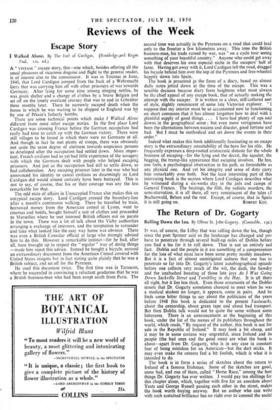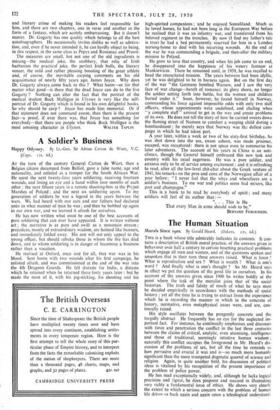The Return of Dr. Gogarty
Rolling Down the Lea. By Oliver St. John Gogarty. (Constable. t SS.) IT was, of course, the Liffey that was lolling down the lea, though since the poet Spenser said so the landscape has changed and you have to penetrate through several built-up miles of Dublin before you find a lea for it to roll down. That is not an entirely sad fact. Dublin and the people in it are something of a compensation for the loss of what must have been some pretty muddy meadows. But it is a fact of almost unmitigated sadness that one has to penetrate so far into Dr. Gogarty's latest autobiographical episode before one collects very much of the wit, the dash, the bawdry and the unabashed boasting of those late joys As I Was Going Down Sackville Street and Tumbling in the Hay. It is all there all right, but it lies less thick. Even those ornaments of the Dublin streets that Dr. Gogarty sometimes chanced to meet when he was a medical student no longer, it appears, come in pairs. And he finds some bitter things to say about the politicians of the years before 1948 (his book is dedicated to the present Taoiseach), about the censorship, about green tape and about bad transport. But then Dublin talk would not be quite the same without some bitterness. There is an announcement at the beginning of this book, under the list of the names of its publishers throughout the world, which reads, " By request of the author, this book is not for sale in the Republic of Ireland." It may look a bit cheap, and it may be in some curious way ungrateful, since Ireland and its people (the bad ones and the good ones) are what the book is about—apart from Dr. Gogarty, who is in any case in constant fear of being mistaken for an American—but the dart sticks. It may even make the censors feel a bit foolish, which is what it is intended to do.
The book is in form a series of sketches about the return to Ireland of a famous Irishman. Some of the sketches are good, some bad, and one of them, called " Horse Race," among the best things Dr. Gogarty has ever written. I would pay ten shillings for this chapter alone, which, together- with five for an anecdote about Yeats and George Russell passing each other in the street, makes the book worth -buying anyway. But an author who can write with such sustained brilliance has no right ever to commit the social and literary crime of making his readers feel responsible for him, and there are two chapters, one in verse and another in the form of a fantasy, which are acutely embarrassing. But it doesn't matter. Dr. Gogarty has one quality which belongs to all the best autobiographers. He occasionally invites dislike as well as admira- tion, and, even if he never intended it, he can hardly object to being, in this respect, in the same class as Pepys and Rousseau and Proust.
The measures are small, but not one of the old ingredients is missing—the medical joke, the snobbery, that relic of Irish barbarism the practical joke, the perfect Irish bulls, the literary veneer, the mild and rather pleasing boasting of the great athlete and, of course, the inevitable carping comments on his old acquaintance of nearly fifty years ago, James Joyce. Why does Dr. Gogarty always come back to this ? What harm—or for that matter what good—is there that the dead Joyce can do to the live Gogarty ? Nothing can alter the fact that the portrait of the medical student Buck Mulligan in Ulysses is very like the self- portrait of Dr. Gogarty which is found in his own delightful books. So why should he carp ? Joyce has made him immortal. Or if that statement does not command assent, then there is the present fact—a proof, if ever there was, that Joyce has something for everybody—that there are people who think Buck Mulligan is the most amusing character in Ulysses. WALTER TAPLIN



































 Previous page
Previous page